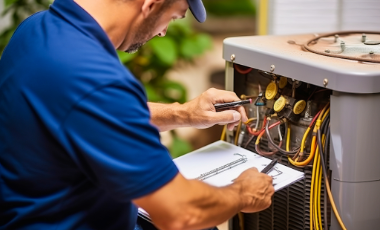The Impact of Indoor Air Quality on Health and Well-being: A Bay Area HVAC Guide
Introduction: Understanding the Importance of Indoor Air Quality
Indoor air quality (IAQ) refers to the quality of the air inside buildings and structures, particularly as it relates to the health and comfort of occupants. The significance of IAQ cannot be overstated, as we spend a significant portion of our lives indoors, especially in regions like the Bay Area where weather conditions often necessitate indoor activities. Poor IAQ can have detrimental effects on our health and well-being, leading to various respiratory issues, allergies, and even chronic diseases.
Common Indoor Air Pollutants and Their Effects on Health
Numerous pollutants can contaminate indoor air, posing risks to our health. One of the most common pollutants is particulate matter, which includes dust, pollen, pet dander, and mold spores. These particles can trigger allergies, asthma attacks, and other respiratory problems. Volatile organic compounds (VOCs) are another significant contributor to poor IAQ. VOCs are emitted by various household products such as cleaning agents, paints, and furniture, and can cause headaches, dizziness, and even long-term health effects.
Additionally, indoor air can be contaminated by biological pollutants like bacteria, viruses, and fungi. These microorganisms can lead to respiratory infections and worsen existing conditions such as asthma. Radon, a naturally occurring radioactive gas, is another dangerous indoor air pollutant. Prolonged exposure to radon can increase the risk of lung cancer, making it a serious concern for Bay Area residents.
Improving Indoor Air Quality: HVAC Systems and Maintenance
One of the most effective ways to improve IAQ is through the use of HVAC (Heating, Ventilation, and Air Conditioning) systems. HVAC systems help regulate temperature, humidity, and air circulation, reducing the concentration of pollutants in indoor air. Regular maintenance of HVAC systems is crucial to ensure their optimal performance. This includes cleaning or replacing air filters, inspecting ductwork for leaks, and scheduling professional HVAC maintenance at least once a year.
In addition to HVAC systems, proper ventilation is essential for maintaining good IAQ. Opening windows and using exhaust fans in kitchens and bathrooms can help remove pollutants and bring in fresh air. Air purifiers and dehumidifiers can also be used to further enhance IAQ by removing allergens and controlling moisture levels.
The Benefits of Good Indoor Air Quality for Health and Well-being
Investing in good IAQ has numerous benefits for our health and overall well-being. Firstly, it can significantly reduce the risk of respiratory problems such as asthma and allergies. According to the Environmental Protection Agency (EPA), improving IAQ can lead to a 20% decrease in asthma symptoms. Moreover, good IAQ can enhance cognitive function and productivity. Studies have shown that improved IAQ in schools and workplaces can lead to better concentration, reduced absenteeism, and increased performance.
Furthermore, good IAQ is particularly important for vulnerable populations such as children, the elderly, and individuals with pre-existing health conditions. For example, children exposed to poor IAQ are more likely to develop asthma, while the elderly may experience exacerbated respiratory symptoms. By prioritizing IAQ, we can create healthier environments for these individuals and reduce healthcare costs associated with respiratory illnesses.
In conclusion, the impact of indoor air quality on health and well-being cannot be ignored. Understanding the common indoor air pollutants and their effects on health is crucial in addressing IAQ concerns. By utilizing HVAC systems and implementing proper maintenance practices, we can significantly improve IAQ. The benefits of good IAQ extend beyond physical health, positively impacting cognitive function and productivity. Prioritizing IAQ is essential for creating healthier and more comfortable living and working environments in the Bay Area and beyond.


